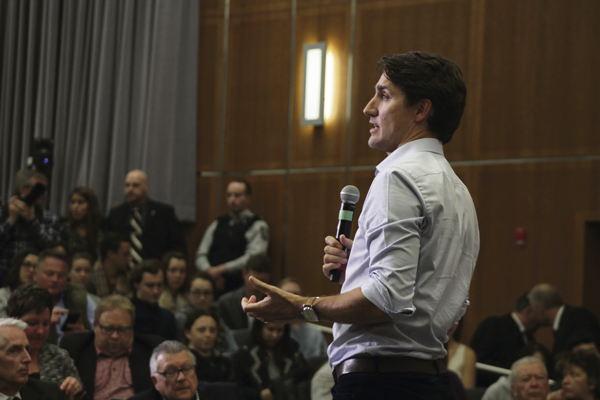Wednesday marked one year since the release of the National Inquiry into Missing and Murdered Indigenous Women and Girls (MMIWG), and a First Nations women’s organization is speaking out about the government’s lack of action since.
The Native Women’s Association of Canada (NWAC) gave the government a failing grade in its report card for the government’s response to the inquiry, criticizing the lack of a national plan.
“Regrettably, the bleak everyday reality faced by thousands of Canadian Indigenous women, girls, and gender-diverse persons has not fundamentally changed since the publication of that report,” read the report card.
“More disappointingly still, in the absence—a whole year later—of any federal National Action Plan as well as a general paucity of publicly available information, it is entirely unclear what the government concretely intends to do to ensure follow-up to the Final Report’s Calls to Justice.”
The NWAC’s report card handed down ‘fails’ on government follow-ups to all four rights included in the inquiry—the right to culture, the right to health, the right to security and the right to justice. The NWAC had three other options for grades, which also included ‘pass,’ ‘action required’ and ‘insufficient information.’
Back in December, Crown-Indigenous Relations Minister Carolyn Bennett said the federal government was planning on delivering a national action plan this month.
But, as Prime Minister Justin Trudeau explained, the COVID-19 pandemic delayed Ottawa’s plans. He said the action plan is of “urgent priority,” requiring “ongoing work with all partners.”
“The National Inquiry has shown us the way forward. We know that there is still much more to do to end the systemic gender and racial discrimination that continues today. As we continue to walk the path of reconciliation, we will listen to the voices of families and survivors, as well as grassroots organizations and Indigenous leaders who work every day to advocate for their communities and keep them safe,” said Trudeau in a statement.
The prime minister listed a number of steps the government has taken to address the inquiry’s 231 calls for justice. These include the recent announcement of funding for Indigenous communities to build safe shelters for women and children trying to escape domestic violence.
Critics haven’t accepted the COVID-19 pandemic as an excuse, as the government had eight months prior to the pandemic to take action.
With no timeline for the national action plan, the NWAC expressed disappointment.
“Instead of a National Action Plan, we have been left with a Lack-of-Action Plan,” said NWAC President Lorraine Whitman.
“But the Indigenous women of Canada are pressing ahead. The fact is, we cannot afford to do nothing in the face of the violence that continues to take the lives of First Nations, Métis and Inuit women.”
The organization said it gave the government a list of eight measures it could implement as it moves towards a national plan. However, as of Wednesday, the NWAC said it hasn’t received a response from Ottawa.
“Some provinces and territories have made headway,” said Marion Buller, the inquiry’s chief commissioner.
“Yukon has forged ahead with its own plan, so the work can be done in a timely and thorough way. And NWAC is helping to chart a path forward with eight proposals it has offered to the government, all of which could have been included in a plan.”
Whitman said the NWAC has “not abandoned hope” that the federal government will deliver a national plan and take its suggestions seriously.
The national Congress of Aboriginal Peoples (CAP), which represents First Nations people living off-reserve, also voiced the need for further action.
It highlighted the inquiry’s first call to justice: “All programs must be no-barrier, and must apply regardless of Status or location.”
The CAP said the government’s “unequal approach,” excluding those living off-reserve, is clear in its COVID-19 response.
“Hundreds of millions in funding have been allocated towards a minority of Indigenous people based on their membership in selected organizations, while the majority have been left with only a small fraction of the total. Frustration continues to mount with the announcement last week of further delays in a National Action Plan and the lack of a clear path forward,” said the CAP in a news release.
“CAP has been a partner in the MMIWG process since the beginning. We have informed the government repeatedly of the gaps in their approach, and we have not seen meaningful changes,” added CAP National Chief Robert Bertrand.
Meanwhile, the Government of Saskatchewan says a new investment is following one of the inquiry’s calls to actions.
Also on the one-year anniversary, Minister Responsible for First Nations, Métis and Northern Affairs Lori Carr announced a $300,000 investment for a First Nations and Métis Community Projects grant program. A release said it will focus on locally-developed projects related to issues raised by the national inquiry into MMIWG.
“This investment is to build upon the efforts of this Inquiry by funding Indigenous-led projects to help make this province we share a better place one step at a time,” said Carr.
Organizations interested in grants can contact fnmr@gov.sk.ca or call (306) 798-0183 to discuss their project ideas and for application information.
The government said it will advance call for justice 15.1, calling on Canadians to “Denounce and speak out against violence against Indigenous women, girls, and 2SLGBTQQIA people.”
A NWAC online survey suggested 18 per cent of Indigenous women and 25 per cent of two-spirit people across the country have experienced violence in the past three months.


